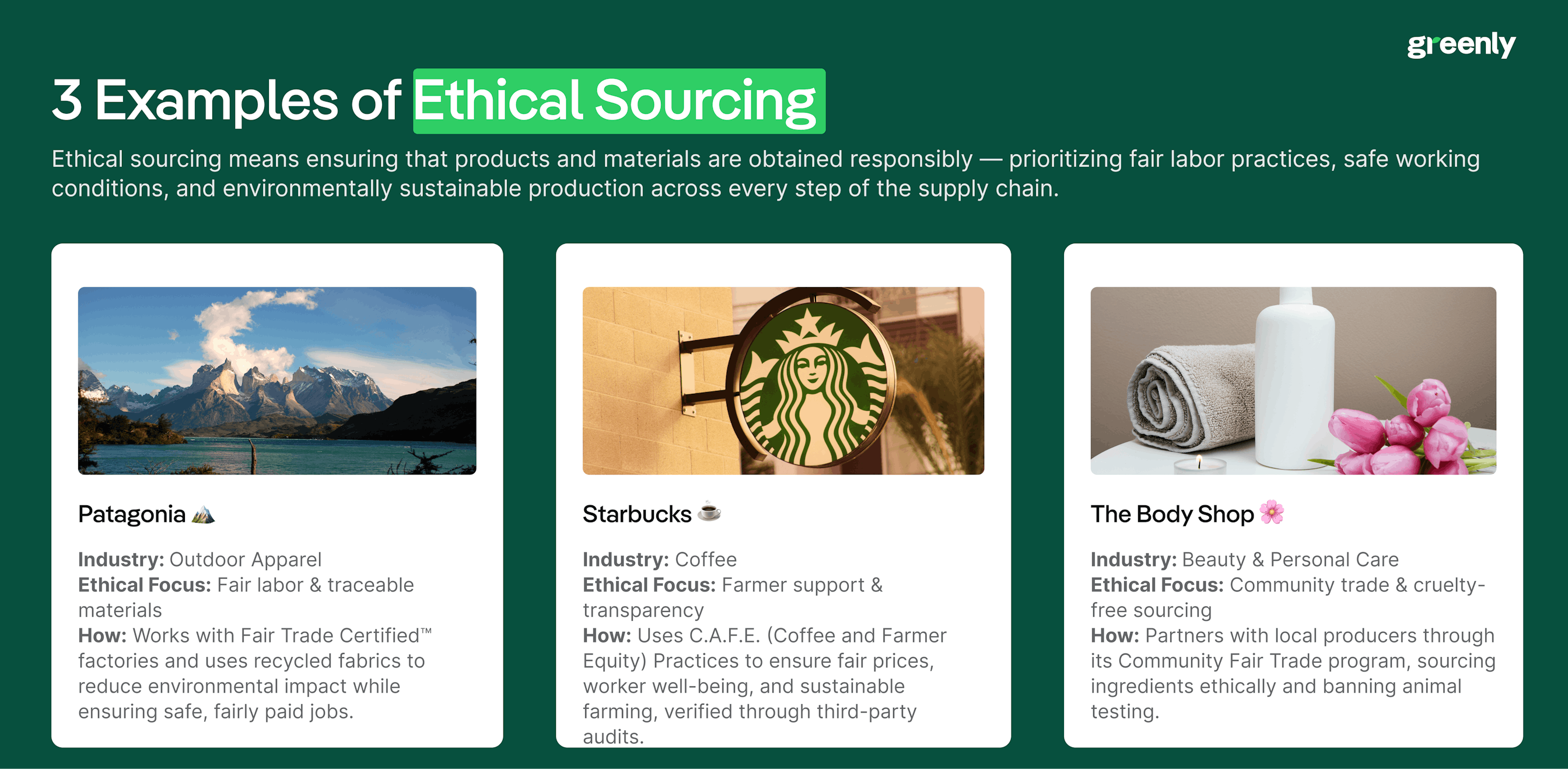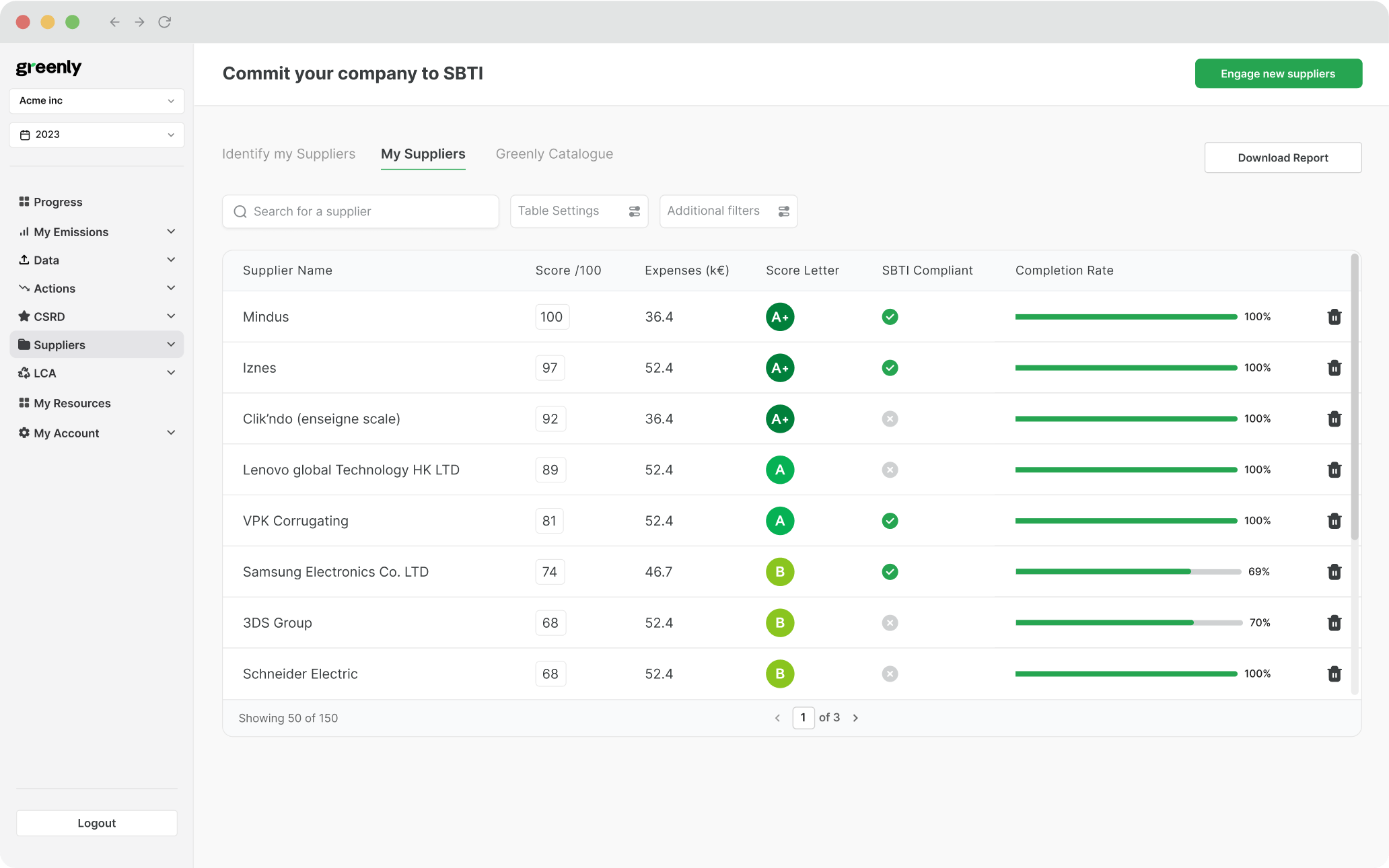
What are the 3 Pillars of Corporate Sustainability?
In this article, we'll explore what the 3 pillars of corporate responsibility are, why they're important, and how businesses can turn them into practical action.
ESG / CSR
Industries



What ethical sourcing is and its importance in the midst of climate change
The benefits of using ethical sourcing
How businesses can employ ethical sourcing
As climate change continues to progress, companies in today’s public sector are forced to realize that cost and quality of their products and services can only go so far – and that more needs to be done throughout the entire process of manufacturing and selling a product, such as through ethical and sustainable sourcing.
Unethical practices can be, unknowingly, prevalent throughout a company’s supply chain, such as through illegal activities or ignoring the negative impacts of climate change.
In order to develop a company that is committed to ethical sourcing, additional ethical considerations, ethical practices, and measures must be taken to successfully be deemed as an ethically sourced brand.
In this article, we'll explore what ethical sourcing is, what are its main goals, why is it important, and how it can be implemented successfully.
Therefore, ethical sourcing is determined through the suppliers a company chooses to work with, as the raw materials are ultimately chosen by those suppliers.
For instance, a company that opts to work with a t-shirt manufacturing company must realize that the factory producing the t-shirts is the ultimate entity deciding how the materials used to produce those t-shirts are sourced. If a company chooses a manufacturer based on quantity and productivity over the types of materials used in the factory, this could be considered an example of unethical sourcing.
However, if a company chooses a t-shirt supplier that is cognizant of the negative impact of clothing materials such as polyester, nylon and acrylic have on the environment and opt to use silk, organic cotton, linen, or hemp instead – the supplier and company are exhibiting ethical sourcing.
| Example | Description |
|---|---|
| Fair Trade Products | Sourcing products like coffee, tea, and cocoa that are certified as fair trade ensures that farmers and workers are paid fairly and work under safe conditions. |
| Transparency | Being open about supply chains by sharing information on sourcing practices, supplier identities, and the origins of materials ensures accountability and builds consumer trust. |
| Social Impact | Choosing suppliers that invest in local communities, provide education, and improve healthcare reflects a commitment to positive social impact in sourcing practices. |
| Compliance with Regulations | Ensuring that suppliers comply with local and international labor laws, environmental regulations, and human rights standards is key to ethical sourcing. |
However, it is important to note that ethical sourcing isn’t just about the materials used. Another important component to ethical sourcing is to remain aware of the environmental and social impact that the materials chosen can have on human life.
For example, a coffee company that opts to use plastic straws instead of paper ones is not only contributing to excessive greenhouse gas emissions – but compromising marine life as well.
Materials that may be cheaper to source could require child labor or hazardous working conditions. All of these are important to keep in mind when seeking to become an ethically sourced supplier or company.

Ethical sourcing, also referred to as responsible sourcing, is imperative as it is the first step in the creation of any product or service, and is the backbone for the overall sustainability of the company as looking to assess ethical risks from supply chains can help to improve responsible and sustainable methods for business practices moving forward.
Think of ethical sourcing in a similar manner to sourcing ingredients at a Michelin star restaurant. Of course, what makes the Michelin star restaurant worthy of the coveted fifth star is the superior preparation and cooking of the dishes themselves – but in order to achieve that level of expertise and critical acclaim, the restaurants must source the freshest ingredients possible.
The same goes for any company looking to improve upon their sustainability, transparency, or seeking to reduce their carbon footprint. Everything starts with their supplies, meaning that in order to adhere to the ideals of ethical sourcing – monitoring a company’s supply chain is key.
The overview cards below will reveal some of the reasons why ethical sourcing is important:
Responsible sourcing boosts credibility, strengthens your brand story, and differentiates you from competitors.
Ethical standards help ensure fair wages, safe working conditions, and respect for human rights across suppliers.
Clear visibility into sourcing and production builds accountability and makes issues easier to spot and fix.
Meeting labor and environmental laws reduces legal exposure, fines, and disruption from non-compliant partners.
Consumers prefer brands that align with their values, driving repeat purchases and positive word-of-mouth.
Investing in responsible suppliers fosters long-term relationships, stability, and better quality over time.
In addition, ethical sourcing has never been more crucial in the midst of climate change – as companies are beginning to realize that a successful business cannot excel on quantity and affordability alone, but that customers and investors alike are becoming more interested investing their money and time into companies that take initiative in rectifying the current environmental circumstances.
Ethical sourcing and sustainable procurement also helps to protect employees against various deleterious occurrences, such as from unfair working hours, corruption, fraud, child labor, and unsafe working conditions. A company needs to have efficient and committed employees in order to successfully transition towards sustainability, and therefore – ethical sourcing must be implemented to ensure the continued interest of employees towards the company or organization’s ultimate goal and environmental targets.
Ethical sourcing is not only a way for companies to avoid operational business risks, to safeguard the brand’s reputation, or avoid greenwashing – but as a means to gain a competitive advantage against their current or potential competitors in their industry. In the end, ethical sourcing can help to reduce emissions, improve sustainability, and actually increase business revenue.

Seeking to achieve ethical sourcing can warrant several different goals, such as by helping to improve business management, supply chain management, reduce operational costs, raising the bar on current ethical standards, and address environmental and social impacts by benefiting the brand, surrounding community, and planet.
Seeking to achieve ethical sourcing can warrant several different goals, such as by helping to improve business management, supply chain management, reduce operational costs, raising the bar on current ethical standards, and address environmental and social impacts by benefiting the brand, surrounding community, and planet.
Sometimes, the terms ‘ethically sourced’, ‘fair trade’, ‘cruelty free’ and ‘organic’ may be used interchangeably – but they don’t all mean the same thing. This can make understanding the main goal of ethical sourcing difficult.
The summary cards below will reveal the differences between the terms ‘ethically sourced’, ‘fair trade’, ‘cruelty free’ and ‘organic’:
“Ethically sourcing” refers to when products and services are procured in an ethical manner – such as by ensuring the receiving of the product did not disrupt working conditions, put employees in harm's way, result in fraudulent or illegal behavior, or harm the environment.
Ethically sourcing is not a standard definition in legal terms, meaning consumer marketing cannot be used as a term to set specific standards.
Think of ethical sourcing in a similar manner to the term, “clean eating” – which many use to refer to eating a healthy diet. However, the term “clean eating” remains too general among many, and there are no set guidelines to use to decipher who subscribes to this style of eating. The same goes for ethically sourcing products or services in a company.


“Fairtrade”, on the other hand, is a widely accepted term that can serve as a certification for those in the agriculture industry around the world. This certification system refers to products that have met the guidelines to be considered fair trade – meaning there is an actual set of standards to be met, unlike ethically sourced products. This will be indicated with a Fairtrade label on the packaging of the product.
“Cruelty free” is a term most often used by cosmetic brands, as it refers to products that haven’t been tested on animals. Cruelty free isn’t to be used interchangeably with the term “vegan” – as many products that haven’t been tested on animals can still contain byproducts of animals. Similar to ethical sourcing, there is no standard legal definition for cruelty free products in the U.S. – but it is widely used for consumer marketing.
Lastly, “organic” refers to products that have been grown without the use of pesticides or other toxic chemicals used to genetically modify those harvests of various produce. The U.S. has jurisdiction over what can be labeled as “organic”, through the help of the United States Department of Agriculture – or the USDA. Similar to “Fairtrade”, products deemed as organic must meet federal standards in order to be labeled as organic.
For instance, foods labeled as organic might need to prove the quality of soil they were grown in, how pests and weeds are controlled, and how the use of pesticides are prevented.
The major difference between organic and ethically sourced products is that organic only refers to the production of the food and not how workers are treated in the process.

Out of these four terms, ethically sourcing covers the widest variety of potential areas that could be negatively impacted by the procurement of a product.
Ultimately, the main goal of ethical sourcing is to encourage businesses to take a look at their supply chain and trace as far back to the beginning of their sourced materials to ensure that those materials have been procured with employee and environmental safety in mind.
There are several benefits to be had by society, the environment, and businesses themselves who commit to the idea of ethical sourcing.
One of the many benefits of ethical sourcing is how ethical sourcing can help buyers to prevent contributing to an entire chain of unethical practices. This is because suppliers can often be intertwined with other entities which help them to secure their raw materials in the first place, many of which may present unethical challenges and consequences on their own – such as contributing to corruption or unsafe working conditions to secure those materials.
Therefore, ethical sourcing can help companies to trace the environmental and societal impact of their products all the way to the beginning – and strive to seek new suppliers that will contribute to ethical sourcing and greater sustainability.
Want to learn more how tactics beyond ethical sourcing could help save the planet? Check out Leaf media podcast below:
Ethical sourcing is also beneficial as it prevents greenwashing, false advertising, protects employees, mitigates environmental catastrophes such as animal abuse, deforestation, or the production of harmful substances, and builds trust with customers. Ethical sourcing can also help to decrease the risk of a legal issue, improve employee motivation, and improve communication throughout the supply chain.
Ultimately, ethical sourcing can help the environment, the surrounding community, all forms of life, and the prosperity of the business seeking to implement ethical sourcing itself.
The interactive flip cards below (move cursor over card to flip) will reveal additional benefits of ethical sourcing for both suppliers and companies:
Ethical sourcing is implemented through the use of an efficient and well established policy that helps to monitor the products, goods, and services being acquired – and that they are sourced sustainability and responsibility.
Remember, ethical sourcing starts at the buyers – or those in charge at a company of purchasing the materials or choosing the suppliers to be used.
Ultimately, ethical sourcing starts at the buyers – or those in charge at a company of purchasing the materials or choosing the suppliers to be used.
The vertical timeline below will reveal the process of how ethical sourcing is implemented:
Companies begin by evaluating potential suppliers based on labor practices, environmental standards, and transparency.
Suppliers agree to uphold a clear code outlining fair wages, safe working conditions, and responsible environmental behavior.
Ongoing education and partnership ensure that suppliers understand ethical sourcing goals and best practices.
Regular inspections and third-party audits verify compliance with ethical sourcing standards and identify areas for improvement.
Companies and suppliers work together to enhance sustainability, minimize waste, and strengthen social responsibility across the supply chain.
Results are shared through sustainability reports or public disclosures to maintain accountability and consumer trust.
One of the most important questions that these buyers should ask themselves when purchasing materials, seeking new suppliers, or adjusting their supply chain is if the potential suppliers are committed to quality.
This will help to reveal if their suppliers are seeking economic or financial gain, or truly committed to rectifying the current environmental predicaments in addition to ensuring the safety and well-being of employees at the companies they are considered suppliers.
Another key factor in choosing suppliers to ensure the ethical sourcing of products, goods, and services is to notice the economic factors associated with the potential suppliers.
If choosing the supplier helps to benefit the local economy more than it does increase individual business revenue, the supplier might be a good choice for ethical sourcing – as it helps to improve the viability and functioning of the local community where the business operates.
This will help to reveal if their suppliers are seeking economic or financial gain, or truly committed to rectifying the current environmental predicaments in addition to ensuring the safety and well-being of employees at the companies they are considered suppliers.
Ultimately, ethical sourcing practices can help business to improve their supply chain management and increase the longevity of their business – all while helping to address pivotal environmental and social challenges.

If reading this article about the definition, goals, and key ways to implement ethical sourcing within a company or a supply chain has made you interested in reducing your carbon emissions to further fight against climate change – Greenly can help you!
The majority of ethical sourcing relies on companies recruiting the use of sustainable suppliers and to measure their scope 3 emissions, and Greenly’s got you covered – click here to book a demo and learn more about how we can help you to measure and reduce your various scope emissions.
Greenly can help you make an environmental change for the better, starting with a carbon footprint assessment to know how much carbon emissions your company produces.
